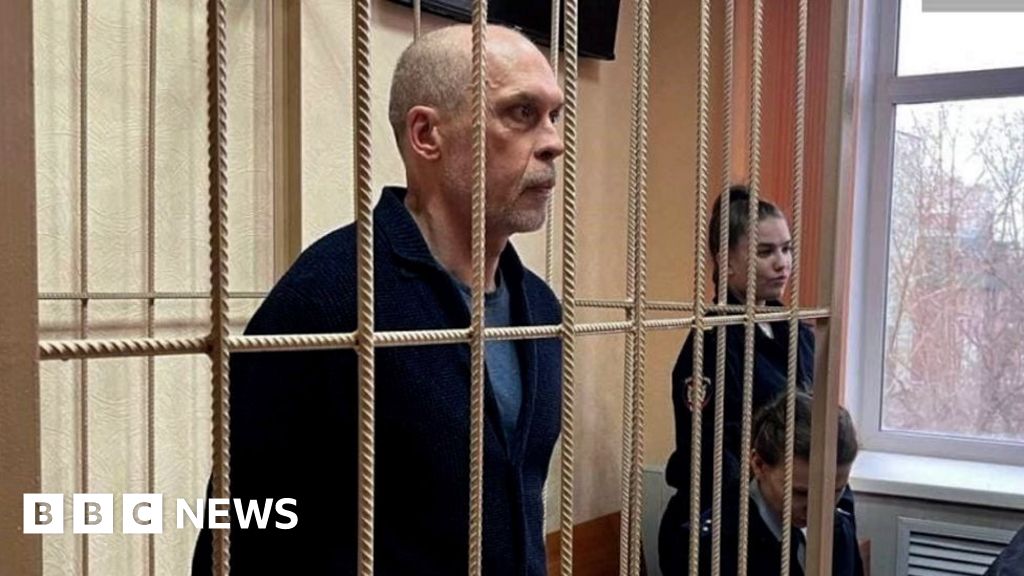Police arrived at Andrey Perlov’s house in Siberia near Novosibirsk, around 06:45 am on 28th March.
He and his family denied that he stole about three million roubles (about $32,000; £24,000) from the Novosibirsk Football Club where he worked as the managing director.
Perlov, 62, won a gold medal at the 1992 Olympics for winning a 50km race-walk.
His family claims he has been in detention for more than six month and is being pressed to agree to fight for Ukraine. He was told that in exchange, the embezzlement charges against him would be froze and possibly dropped when the war ended.
It’s not a secret that prisoners are being recruited to fight for Ukraine. But BBC analysis can reveal that the initial focus was on criminals who had been convicted, but has now shifted to people who have yet to be tried.
Both prosecution and defence attorneys are now legally required to inform those charged with the majority of crimes that they can choose to go to court or to war.
The law, passed in 2024, states that if the signatories agree to it, any investigation and prosecution will cease. At the end of the conflict, their cases will be closed.
“This has turned Russia’s law enforcement system upside-down,” says Olga Romanova. She is the director of Russia Behind Bars, an NGO which provides legal assistance to prisoners.
“Police can now capture a man by a corpse he just killed.” The killer is handcuffed and then says, “Oh, wait, I’m going on a special operation.” They close the criminal case.
We received a recording of an investigator explaining the benefits of signing a contract for the Russian army to a woman whose husband was already sentenced to three year imprisonment for theft.
“He can get six additional for this other offense,” he tells his wife. “I gave him the chance to sign a contract.” If his request is granted, he will go into war and we’ll close the case.
If the accused signs the document, the criminal case will be suspended within a few weeks and they will leave almost immediately for the front lines.
Three Russian lawyers confirmed that this is the norm in the country.
Yaroslav Lipovsky, a teenager from Russia, found out that signing up for the program is not a simple way to avoid prison and a criminal history.
He signed a contract after being accused of “intentionally inflicting serious harm to health” by a group.
Lipavsky’s young girlfriend just discovered that she was pregnant. To avoid prosecution, he enlisted in the military when he turned 18 years old.
He was one of the youngest soldiers killed in the war.
It’s unclear how many people who have been accused of crimes chose to fight rather than face trial. However, this policy shift reflects Russia’s desire to increase its troops while reducing the number of civilians that it must mobilise.
“Do Russians care if prisoners or convicts are in prison?” Michael Koffman is a military analyst with the Carnegie Endowment for International Peace. He says, “I suspect that they do not.”
He believes that the government “likely assumed that these were people they could lose, that no one would miss them and that they wouldn’t have a significant, negative impact on the overall economic”.
Yevgeny Prgozhin, the late leader of the Wagner mercenary team, recruited prisoners from high-security prisons. He claimed that he needed “criminal talent” in exchange for pardons.
The BBC and Russian website Mediazona both have access to and verified confidential documents which shed light on how prisoners are recruited, what happened to them and why it is important to keep the flow of new fighters going.
Analyzing the dog tags of convicts that died in Ukraine, and payments made to families, we know that Wagner recruited almost 50,000 inmates in penal colonies and at one time, they were losing up 200 in combat every day. Many others were wounded.
All prisoner dog tags begin with the letter “K”, which stands for “kolonya”, or prison colony.
The first three numbers are the prison from which they came, and the last three are the recruit. They are given in order, so the higher the numbers, the more recruits that came from the colony.
Payment records show that between July 2022 to June 2023, more than 17,000 prisoners died trying to capture Bakhmut city in eastern Ukraine.
Wagner and the Ministry of Defence have both adapted their recruitment strategy to increase the pool of candidates they can draw from.
Some people accused of crimes reject the new deal due to their opposition to war, others because of the dangers of being injured or killed on the battlefield, and others simply because they want to remain at home to fight the case.
Alina Perlov, daughter of Andrey Perlov, says that authorities can exert enormous pressure on them.
“He refused, and we made a lot of noise in the local press so he was sent into the strict punishment cell where they brought him the same contract again.”
She says that after he refused the second time, his family was forbidden to see him or call him.
They still hope to prove their father’s innocence, but when Alina last saw him in court, in mid-July he had lost weight. “He tries his best to stay cheerful,” she says. “But if they continue, they will break [him].”
We asked the Russian authorities if they unfairly pressure detainees into joining the army. They did not reply.
Read More @ www.bbc.com













